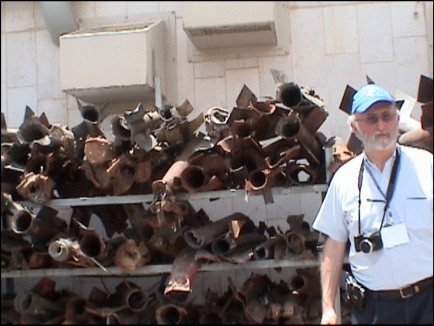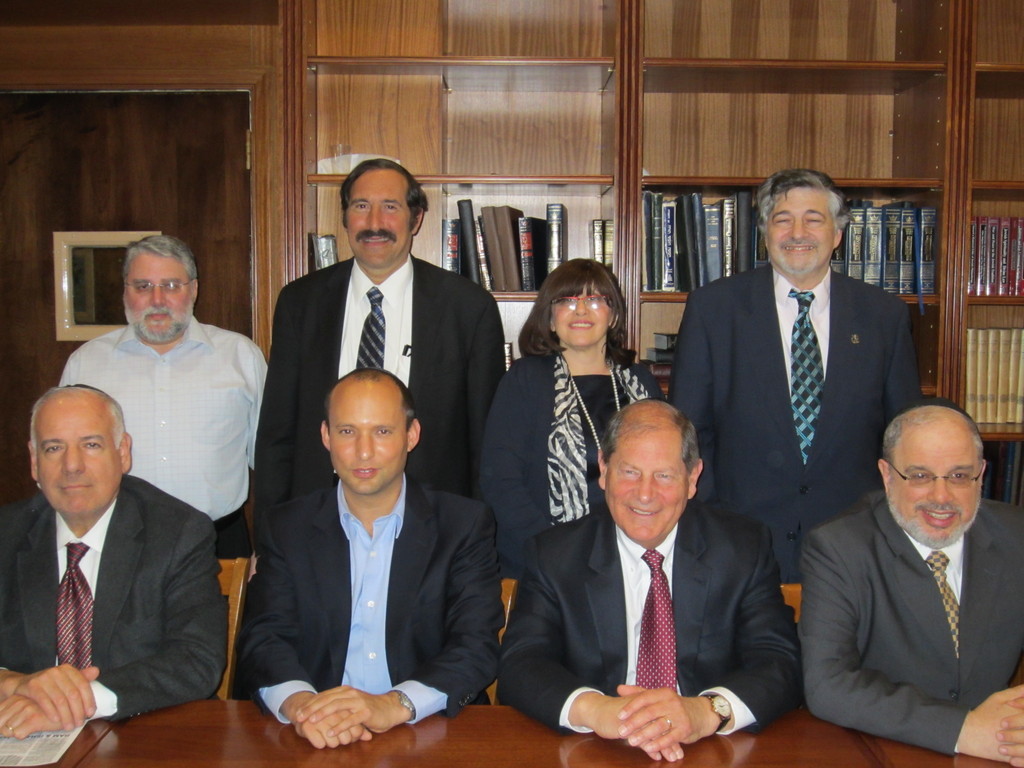Bombs over Be’er Sheva—why are media silent?
As over 200 rockets rained damage and destruction on southern Israel this weekend, traumatizing over one million men, women and children living in the area, the international media once again turned a blind eye only commenting much later to equate Israel’s surgical military strikes with the terrorism aimed at random civilian areas.
An Egyptian brokered cease fire with Hamas was to take effect Tuesday at 1 a.m., but, as usual, Gaza terrorists fired a rocket that landed near Sderot a few hours later, followed by five mortar shells and two Kassam rockets.
Over the past few months, there have been no reports in the media of anything happening at the Gaza border but terrorists from Gaza “have been shooting one to three missiles every day” into Israel, said Dr. Michael Frogel, a resident of Belle Harbor, attending pediatrician at Cohen Children’s Medical Center, principal Investigator New York City Pediatric Disaster Coalition, and Vice President of American Physicians and Friends for Medicine in Israel.
Magen David Adom reported treating 40 casualties from the recent attacks, including an 80-year-old woman with a head injury and two people hurt by shattering glass from a grad missile in Ashdod.
There were “people with 50 to 100 pieces of shrapnel in them,” Frogel noted. “The missiles are serious militarily but also psychologically. The missiles land all over the place. They are not strategic warheads to damage military installations. The intention is to hurt and kill civilians; the missiles are filled with nails and ball bearings. The attacks are meant to damage civilians, to terrify people and literally tear them to pieces and inflict severe damage.” He noted that with rockets reaching Beer Sheva and with Islamic Jihad now in possession of Iranian missiles that reach Tel Aviv, over one million people are under threat of rocket fire. Frogel travels once or twice a year to Sderot, bringing doctors there, participating in and holding emergency preparedness courses in Israel. “Fifty percent of the people in Sderot have traumatic stress disorder,” he said, rather than post-traumatic stress disorder. “It’s a nightmare. It never ends. The kids don’t do well in school, they sleep with their parents; they regress. They hear the tzeva adom (red alert—that an incoming missile has been detected by Israel’s early warning system). It’s terrifying—they have 15 seconds (to find safety, to get to a bomb shelter).”
Even though Israel’s Iron Dome missile defense system is 90% effective and is able to intercept and destroy most incoming rockets, the Grad missiles that hit damaged 15 homes and a school in Be’er Sheva. “They are very powerful, they can go through buildings,” Frogel said.
“Even if they are not injured they are scared,” he stressed. The residents think “where can I hide, what happens if a Kassam lands, can I leave one kid in the car while I pick up the other in school?” Schools in the area were closed for two days. “To have all these kids out of school is a tremendous burden on the parents,” he pointed out. Sapir College near Sderot informed students that school would be open on Monday but mandatory attendance would not be taken. Students were instructed to follow the directives of their local Home Front Command. “The Home Front Command spends a huge amount of time educating the population. Normal life is over when it (the bombing) starts (but) they are not going to give in to terror,” said Frogel. “The people in Sderot are very tough.”
According to Ynet, 222 rockets were fired over four days from the Gaza Strip, following the targeted assassination of Popular Resistance Committee chief Zuhair al-Qaissi on Friday. The PRC is a Gaza-based terrorist group affiliated with Hamas and was behind the murder of two Israeli soldiers and the kidnapping of Gilad Shalit. Intelligence reports indicated that al-Qaissi was planning a terror attack from Sinai to cross Israel’s border at different points, plant explosives and kidnap. Terrorists are attacking from Sinai, reported Ynet, assuming that Israel would be reluctant to attack targets under Egyptian control. Israel is now going after the targets when they are in Gaza, something that they were reluctant to do preceding the last terror attack in August when eight Israelis were killed by the PRC near Eilat.
Ynet reported that Israel’s Iron Dome intercepted 56 rockets and the IDF launched 37 sorties at missile launch sites and munitions depots. Of the 26 Palestinians killed, 22 were enemy forces, according to IDF Chief of Staff Lt.-Gen. Benny Gantz. “(Israel) tries to hit terrorists and military targets,” emphasized Frogel. “It’s very hard to only hit people who are shooting because they (shoot) from civilian populations.”
“The Islamic terrorists have a simple method,” explained Naftali Bennett, former chief of staff of Benjamin Netanyahu. “Place rocket launchers right next to women and children, shoot on Israeli cities and wait for Israel to retaliate. That’s sure to kill
innocent lives and create a great picture for the media.”
“Israel got advance information of a big impending terror attack and preempted by taking out these terrorists,” continued Bennett. “This saved dozens of Israeli lives. Let me be clear: this is not symmetric: the IDF is targeting terrorists and rocket launchers, while the Islamic terrorists are targeting Israel’s city centers. This escalation may be part of Iran’s plan to distract Israel from the main problem—Iran’s race to acquire a
nuclear weapon.”
Living under the threat of rocket fire might be daunting but Israelis are tough and have adapted to the ever changing definition of normal. “In general, I drive into Be’er Sheva every day and, like everyone, I am most worried about being in my car when the sirens go off,” wrote Faye Bittker, Director of the Department of Publications and Media Relations at Ben-Gurion University of the Negev. “There are no words to describe that feeling of getting out of your car on the side of the road with nowhere to hide as you wait the long minute that the siren sounds while you wait to hear the missiles make impact as they fall. I have had this happen before but yesterday was the closest I have ever been. It was terrifying, but also the quintessential Israeli experience, as some of the other people out there with me were people I know. Someone waving hello just breaks the tension and makes this impossible situation feel almost normal.” Bittker also noted that classes are starting again tomorrow, “Better late than never!”

 49.0°,
Fair
49.0°,
Fair 







